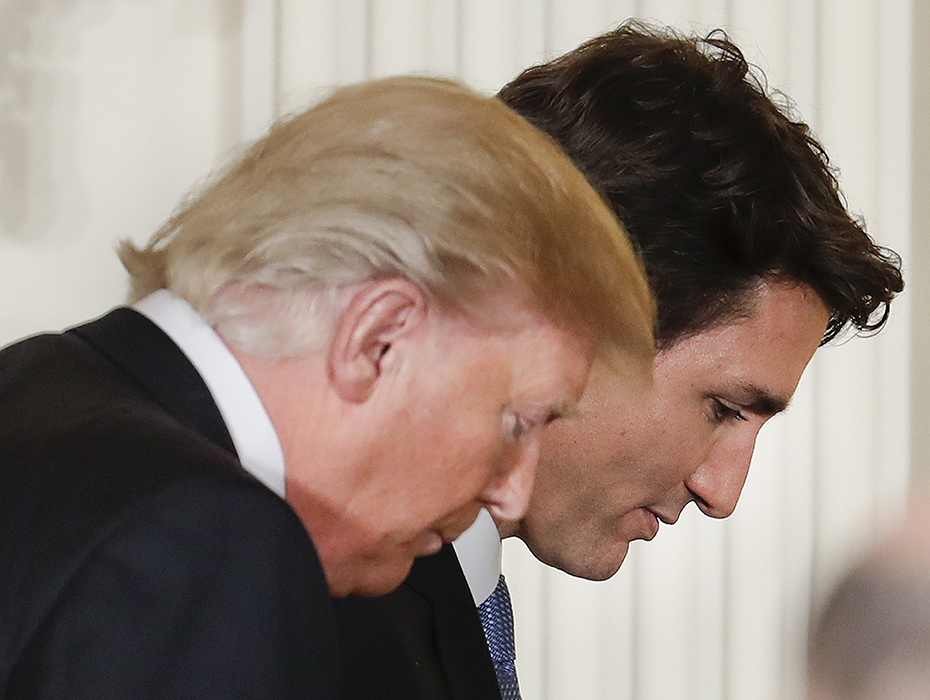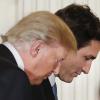
The White House opened the door Wednesday to exempting Canada and Mexico from the proposed tariffs on steel and aluminum, the first pullback from a plan that critics say will spark a trade war.
The White House opened the door Wednesday to exempting Canada and Mexico from the proposed tariffs on steel and aluminum, the first pullback from a plan that critics say will spark a trade war.
Much of the pressure to carve out Canada from President Trump’s big tariffs came from within the U.S. steel industry, which shares ownership in steel mills across the Great White North and reaps hefty profits from cross-border trade.
A tariff exemption for Canada, Mexico and possibly other countries could help tamp down fears about a trade war, but it definitely promises to further boost profits for U.S. steel companies, analysts say.
“The U.S. steel industry has had a long history of pursuing cartel-enhancing trade policies,” said Thomas Prusa, an international trade policy scholar at Rutgers University. “In most cases, the steel executives would benefit from exclusions because it would allow the [multinational corporations] to continue to maximize global profits.”
Some of the largest steel conglomerates, including Arcelor Mittal and Nucor, operate in both the U.S. and Canada.
Canada is the No. 1 supplier of steel imported by the U.S. It supplied about 16 percent of the 26.9 million tons of steel imported last year. Canada also buys more U.S. steel than any other country, accounting for half of U.S. exports.
Other top steel suppliers to the U.S. are the European Union, Brazil, South Korea, Japan and Mexico. Many have threatened to retaliate against Mr. Trump’s tariffs by taxing such U.S. goods as bluejeans, bourbon and motorcycles.
China supplies about 2 percent of steel to the U.S., ranking it as the No. 11 supplier. The country’s steel is also subject to anti-dumping and countervailing duties.
Mr. Trump argues that China supplies much more steel to the U.S. by transshipping, or disguising the origin of the steel by shipping it through other countries.
The president had repeatedly voiced opposition to granting exemptions to his proposed tariffs — 25 percent on steel and 10 percent on aluminum.
He said this week that the tariffs could be adjusted as part of the ongoing renegotiations of the North American Free Trade Agreement among the U.S., Canada and Mexico. The tariffs, however, are a relatively small issue within that massive trade deal.
A redo of NAFTA and slapping tariffs on steel were prominent campaign promises from Mr. Trump.
White House press secretary Sarah Huckabee Sanders made the pivot to potential exemptions.
“There are potential carve-outs for Mexico and Canada based on national security, and possibly other countries as well based on that process,” she said.
She said the exemptions for Canada, Mexico and possibly other countries would be on “case-by-case and country-by-country basis, but it would be determined whether there is a national security exemption.”
The pullback came a day after the resignation of Gary Cohn, the president’s top economic adviser who was fiercely opposed to the tariffs. His resignation was blamed on his clash with Mr. Trump over the tariff plan.
The Commerce Department recommended the tariffs based on an investigation that determined there was a national security risk from U.S. reliance on imported steel and aluminum, which are used extensively in military goods.
Mr. Trump also has been under intense pressure from Capitol Hill Republicans and free trade conservatives who want him to narrowly target tariffs at bad actors such as China.
House Ways and Means Committee Chairman Kevin Brady of Texas and 106 fellow House Republicans sent Mr. Trump a letter arguing for exceptions to the tariff, including grandfathering current contracts for imports and a process to exempt countries.
“We support your resolve to address distortions caused by China’s unfair practices, and we are committed to acting with you and our trading partners on meaningful and effective action. But we urge you to reconsider the idea of broad tariffs to avoid unintended negative consequences to the U.S. economy and its workers,” they wrote.
Despite the alterations to the plan, Mr. Trump is still expected to sign the order by the end of the week, Mrs. Sanders said.
“Look, it’s a lengthy process finalizing the details,” she said. “It’s a complicated process, and we want to make sure we every i’s dotted and all t’s are crossed.”






